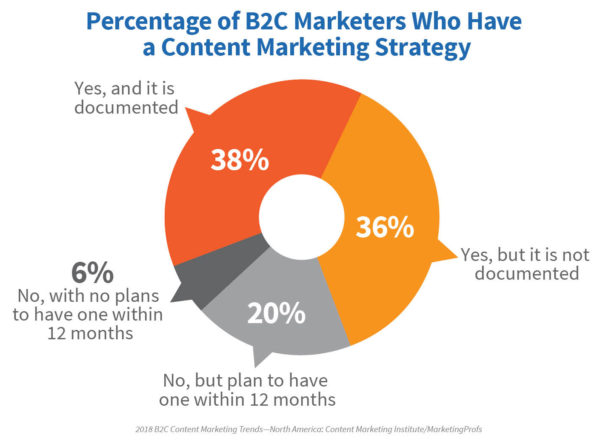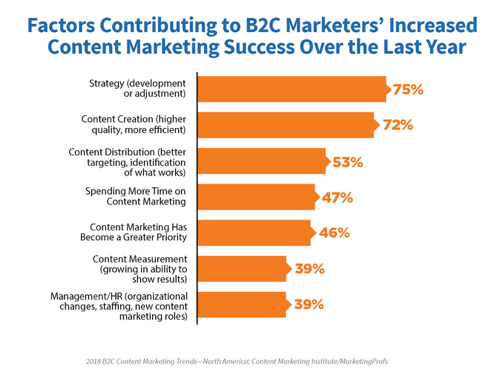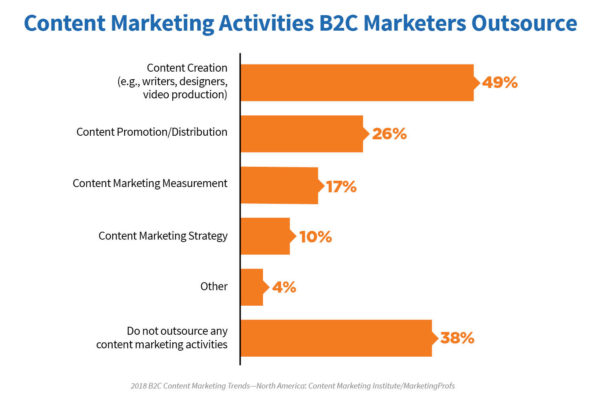 We’ve all known (and probably been part of) small, focused teams that seem to produce incredible results. Unless these teams hang on to their tight focus, though, even the most impressive typically hit a wall. The organizational pressure to do more too often outpaces the team’s ability to keep up.
We’ve all known (and probably been part of) small, focused teams that seem to produce incredible results. Unless these teams hang on to their tight focus, though, even the most impressive typically hit a wall. The organizational pressure to do more too often outpaces the team’s ability to keep up.
B2C marketers may be about to hit that stage given the signs that popped up as we read through the survey data and fill-in responses to the latest annual content marketing research. (You can read the full results in B2C Content Marketing 2018: Benchmarks, Budgets, and Trends—North America, produced by CMI and MarketingProfs.)
Content marketing success increases, but can it last?
Don’t get us wrong – the B2C research reveals many encouraging findings. We saw a higher level of reported success with content marketing, the same level of commitment to content marketing, an increased focus on building an audience, and a higher value placed on creativity and craft in content creation, among other positive signs.
For example, 78% of B2C marketers say they’re moderately to extremely successful (compared with 70% the previous year).
78% B2C marketers say they’re moderately to extremely successful (compared w/ 70% previous year). @cmicontent. Click To Tweet
At the same time, we noted a decrease in the total marketing budget spent on content marketing. For all responding marketers, spending decreased by four percentage points year over year (22% vs. 26%); however, the decrease was more notable year over year among the B2C top performers (26% vs. 38%).
Total #contentmarketing spend decreased by 12% among B2C top performers via @cmicontent research. Click To Tweet
Of course, those results could mean B2C content marketing efforts truly are getting lean and mean – prioritizing the content activities that matter most for their organizations. In fact, 53% say they’re discontinuing content marketing activities found to be ineffective to concentrate on those that yield the best results.
53% B2C marketers say they’re discontinuing #contentmarketing activities found to be ineffective. @cmicontent Click To Tweet
One finding, though, makes us question how long organizations can sustain their increased success while decreasing the budget devoted to it: the lack of a documented content marketing strategy. Only 38% of respondents have one (pretty close to last year’s 40%).

Stay true to the documented strategy
We talk about the need for a documented content marketing strategy every year. And yet most marketers still don’t have one. If you doubt the need to document your strategy, consider the response from a marketer who does have a documented strategy to the survey question: “What content marketing challenges, if any, do you need to overcome in 2018?”
We manage content and social media strategies for more than 10 brands with a two-person team. That is and will continue to be my greatest struggle. We could do more, but we are understaffed.
Two people handling content and social media strategy for 10-plus brands in a mid-sized (100 to 999 employee) company? Wow. And the respondent reports their efforts as very successful.
I bet that two-person team would have a much harder time achieving success without a documented guide. That’s because writing down an agreed upon strategy helps teams like this one maintain a strict focus on only those initiatives that fit the strategy. It guides the decisions and trade-offs that have to be made.
Documenting a #contentmarketing strategy helps teams maintain a strict focus & guide decisions. @LisaBeets Click To Tweet
If one or two people can sufficiently handle the work created by the vision laid forth in the strategy, great. If not, and the organization wants to do more, then decisions will need to be made on how to invest in the resources necessary to grow.
Without a documented strategy, whatever content marketing success you achieve may be all too easily hijacked (as Kevin Lund described in this recent article):
When you prove internally that content marketing works, others inside the organization may view the approach as the cure to what ails them – and want to piggyback on what you’re doing. While it’s a good sign when others want to join you, it’s often done without thinking through an integrated strategy and process.
If you need yet another reason to get your strategy in writing, consider this: 75% of B2C marketers who say their organization is more successful this year compared with one year ago cite strategy as a reason (in fact, it’s the top reason).

Reinforce realistic expectations
Another troubling finding this year: The percentage of B2C marketers who agree their organization has realistic expectations about what content marketing can achieve decreased to 55% from 69% last year.
We’re not sure why the “realistic expectations” percentage decreased so much. It could be that as organizations see initial successes they expect to scale those efforts without first determining the strategy (as Kevin describes) and devoting adequate resources.
The truth is that organizations must be realistic about two things:
Again, a written strategy helps set the appropriate expectations.
Of course, content marketers supplement their in-house teams by outsourcing many tasks, primarily content creation, and a documented strategy is essential to have everyone operating from the same page.

As a side note, our B2C research didn’t indicate that companies outsourcing content marketing functions are any more successful than those that do not. In fact, the top performers were a bit less likely to outsource than the total sample. Whether that indicates that your company would be better served by a cohesive, internal team is up to you to determine based on your unique business circumstances.
Top #contentmarketing performers are a bit less likely to outsource, says @CMIContent research. Click To Tweet
Conclusion
B2C marketers who want to do more with their content marketing – and who could if they had more resources – may want to go back to the strategic drawing board and conduct a thoughtful cost benefit analysis. If that’s you, keep us posted on your results.
For more research findings, view the report released today. Learn about:
- Key differences between top-performing B2C content marketers and their peers
- Digital technologies B2C marketers use for content marketing purposes
- The types of content and email they use
- Which social media platforms they find most effective for distributing content
- How often they take various factors into account while creating content, and much more
To receive the latest CMI research as it’s published, subscribe to our free daily e-newsletter.
Cover image by Joseph Kalinowski/Content Marketing Institute
